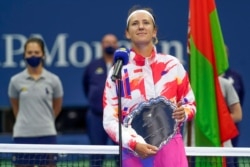After one errant forehand in the first set of the U.S. Open final, Naomi Osaka looked at her coach in the mostly empty Arthur Ashe Stadium stands with palms up, as if to say, "What the heck is happening?"
Surprisingly off-kilter in the early going Saturday, Osaka kept missing shots and digging herself a deficit. But suddenly, she lifted her game, and Victoria Azarenka couldn't sustain her start. By the end, Osaka had pulled away to a 1-6, 6-3, 6-3 comeback victory for her second U.S. Open championship and third Grand Slam title overall.
"I just thought this would be very embarrassing, to lose this in less than an hour," said Osaka, who dropped down to lie on the court after winning.
A quarter-century had passed since the last time the woman who lost the first set of a U.S. Open final wound up winning: In 1994, Arantxa Sanchez Vicario did it against Steffi Graf.
No fun
"I actually don't want to play you in more finals," a smiling Osaka told Azarenka afterward. "I didn't enjoy that."
Osaka, a 22-year-old born in Japan and now based in the United States, added to her trophies from the 2018 U.S. Open — earned with a brilliant performance in a memorably chaotic final against Serena Williams — and 2019 Australian Open.
The 23,000-plus seats in the main arena at Flushing Meadows were not entirely unclaimed, just mostly so — while fans were not allowed to attend because of the coronavirus pandemic, dozens of people who worked at the tournament attended — and the cavernous place was not entirely silent, just mostly so.
Certainly no thunderous applause or cacophony of yells that normally would reverberate over and over and over again through the course of a Grand Slam final, accompanying the players' introductions or preceding the first point or after the greatest of shots.
Instead, a polite smattering of claps from several hands marked such moments.
Osaka stepped onto the court wearing a black mask with the name of Tamir Rice, a Black 12-year-old boy killed by police in Ohio in 2014. Osaka arrived in New York with seven masks bearing the names of Black victims of violence and wore a different one for each match, honoring Breonna Taylor, Elijah McClain, Trayvon Martin, Ahmaud Arbery, George Floyd and Philando Castile.
"The point is to make people start talking about it," Osaka said during Saturday's trophy ceremony.
Focus on racial injustice
She has been at the forefront of efforts in tennis to bring awareness to racial injustice in the United States. She joined athletes in various sports by refusing to compete last month after the police shooting of Jacob Blake in Wisconsin — she said she wouldn't participate in her semifinal at the Western & Southern Open, then decided to play after the tournament took a full day off in solidarity.
Osaka and her coach have said they think the off-court activism has helped her energy and mindset in matches.
The win over Azarenka, a 31-year-old from Belarus also seeking a third Grand Slam title but first in 7½ years, made Osaka 11-0 since tennis resumed after its hiatus because of the COVID-19 outbreak.





